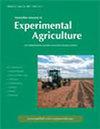Short- and long-range dispersal of the Queensland fruit fly, Bactrocera tryoni and its relevance to invasive potential, sterile insect technique and surveillance trapping
引用次数: 53
Abstract
Dispersal of immature and sexually mature Queensland fruit fly, Bactrocera tryoni (Froggatt) from releases made at a single point was assessed from recapture rates obtained by using arrays of traps. The recapture data (pertaining to distances up to 480 m) fitted both logarithmic and Cauchy models although the fits for the releases of immature flies were inferior because of high variability in catches at certain distances. When combined with data previously published for longer distances, a Cauchy model fitted data for releases of immature flies well and indicated that the median distance dispersed after emerging from the puparium was ~120 m and that 90% of flies would displace less than 800 m despite the fact that a consistent trend in declining catch rates can be obtained up to at least 85 km. This is consistent with the tail of the Cauchy distribution having a slope congruent with a negative power curve and thus being scale invariant for longer distances. The distribution of recaptured flies that were released as adults also fitted a Cauchy model with a tail of the same slope, suggesting that the spatial distribution of long-distance dispersers is not only scale invariant but also age invariant. This has significance to the ability of surveillance trapping arrays to detect infestations and also to methods of distributing insects for the sterile insect technique. Whereas the spread of invading propagules in the first generation is likely to be limited by a decline to non-viable density within 1 km or less of the incursion point, the influence of larger infestations on nearby uninfested regions would be limited by the longevity of the dispersers.昆士兰小实蝇(Bactrocera tryoni)的短距离和远距离传播及其与入侵潜力、不育昆虫技术和监测诱捕的相关性
利用诱捕器阵列获得的再捕率评估了单点释放的未成熟和性成熟昆士兰果蝇的扩散情况。重新捕获数据(涉及到480米的距离)适合对数和柯西模型,尽管由于在一定距离上捕获的数量变化很大,因此对未成熟苍蝇的释放的拟合较差。当与先前公布的较长距离数据相结合时,Cauchy模型很好地拟合了未成熟苍蝇释放的数据,并表明从蛹中出来后分散的中位数距离约为120米,尽管在至少85公里的范围内可以获得捕获率下降的一致趋势,但90%的苍蝇会移动不到800米。这与柯西分布的尾部具有与负功率曲线一致的斜率一致,因此在较长的距离内是尺度不变的。被捕获的成年苍蝇的分布也符合柯西模型,尾巴具有相同的斜率,这表明长距离散布者的空间分布不仅是尺度不变的,而且是年龄不变的。这对监测诱捕阵列检测虫害的能力和昆虫不育技术的分配方法具有重要意义。虽然入侵繁殖体在第一代的传播可能会受到入侵点1公里或更小范围内不可生存密度下降的限制,但较大的侵染对附近未侵染地区的影响将受到传播者寿命的限制。
本文章由计算机程序翻译,如有差异,请以英文原文为准。
求助全文
约1分钟内获得全文
求助全文

 求助内容:
求助内容: 应助结果提醒方式:
应助结果提醒方式:


